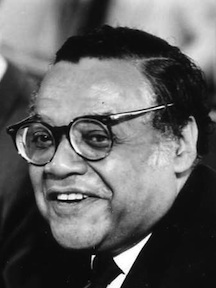By Alexandra Zigomalas
On March 31, civil rights lawyer, activist, and Phi Beta Kappa member William Thaddeus Coleman Jr. passed away. Coleman was directly involved in court cases that changed America during the twentieth century. He helped write the case Brown v. Board of Education of Topeka (1954), which desegregated schools across the nation. He was also involved in McLaughlin v. Florida (1964), which was an important miscegenation case that occurred only three years prior to the famous Loving v. Virginia (1967).
Coleman’s influence on the American legal system is palpable when looking at history. However, Coleman also broke barriers outside of the courtroom. He was born on July 7, 1920 in Georgetown, Pennsylvania. From birth, Coleman was introduced to advocacy and law. His middle name was the name of a lawyer, Thaddeus Stevens, who argued for the ratification of the Fourteenth Amendment. This amendment established equal protection of the laws and was the primary amendment used to argue against segregation in Brown v. Board of Education of Topeka (1954), one of Coleman’s nineteen Supreme Court cases.
Growing up in Philadelphia, Coleman was surrounded by incredibly influential people such as W.E.B. Dubois and Langston Hughes. These men were not simply idols of Coleman, but men who frequented his house and his dinner table. Roanoke College professor Todd C. Peppers quotes Coleman as saying, “I knew we were as good as anybody. I never felt inferior.” Although Coleman was surrounded by important intellectuals and artists, he still could not escape the bitter racism of the Civil Rights era. To give one example, he was not allowed to join the white swim team because of his race. Such experiences made segregation and racism synonymous for Coleman, and combating racism became a major part of his legal career. After graduating from high school, Coleman went on to earn two degrees, one in political science and one in economics, from the University of Pennsylvania in 1941. The Delta of Pennsylvania Chapter of Phi Beta Kappa at the University of Pennsylvania made Coleman a member 1976.
After his days in Philadelphia, Coleman went north to Cambridge, where he earned his law degree from Harvard University. At Harvard, he served on the Harvard Law Review’s editorial board. However after his first year, he entered the Armed Forces because of World War II. While serving in the military, Coleman contributed his legal mind to work on court-martial cases. Ranking first in his class, he graduated from Harvard in 1946 and went on to become the first African American to serve as a clerk for a Supreme Court Justice—Justice Felix Frankfurter, also a Phi Beta Kappa member.
When studying Coleman’s long career, one will always find a consistent passion for justice and equality. He worked alongside Thurgood Marshall, was a lawyer in the investigation of John F. Kennedy’s assassination, and a defense lawyer for countless discrimination and Civil Rights cases. He was also the Transportation Secretary under Gerald R. Ford, which made him the second African American to hold a cabinet position in the history of the country. In 1995, he was honored with the Presidential Medal of Freedom. Bill Clinton was quoted as saying, “If you are looking for an example of constancy, consistency, disciplined devotion to things that make this country a great place, you have no further to look than William Coleman Jr.”
Coleman consistently used his knowledge and positions to create lasting and effective change. He was a defender of education, equality, and justice, and his dedication to learning and to civic duties embodied all that it means to be a Phi Beta Kappa member.
Alexandra Zigomalas is a junior at Stony Brook University double majoring in history and art history. Stony Brook University is home to the Alpha Beta of New York Chapter of Phi Beta Kappa.




